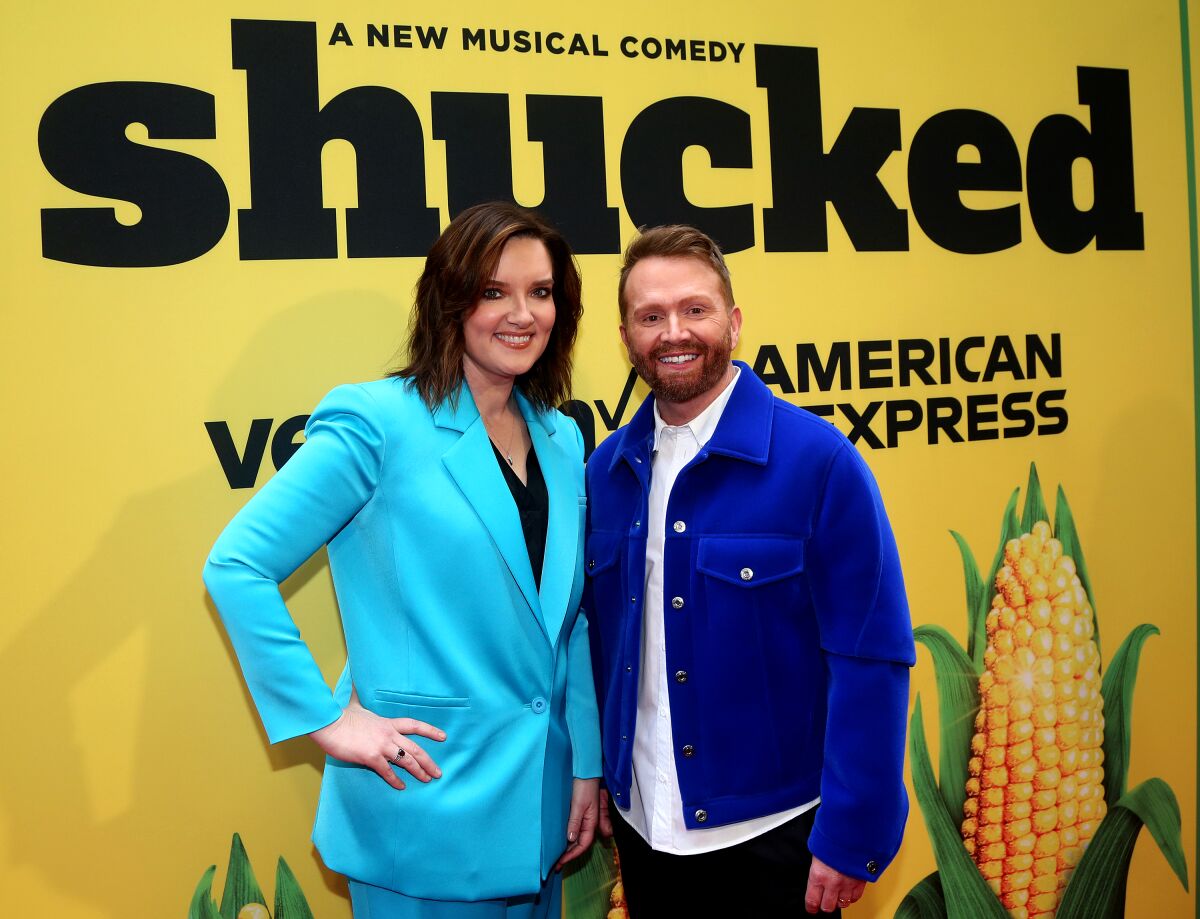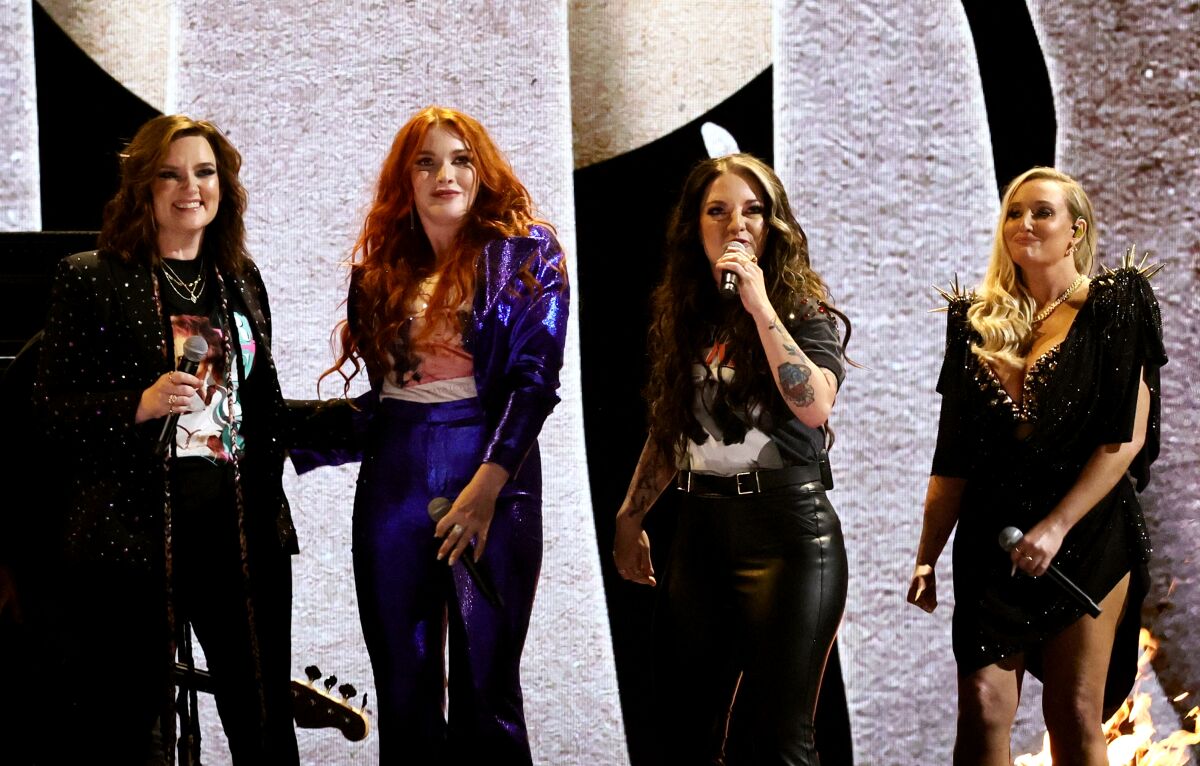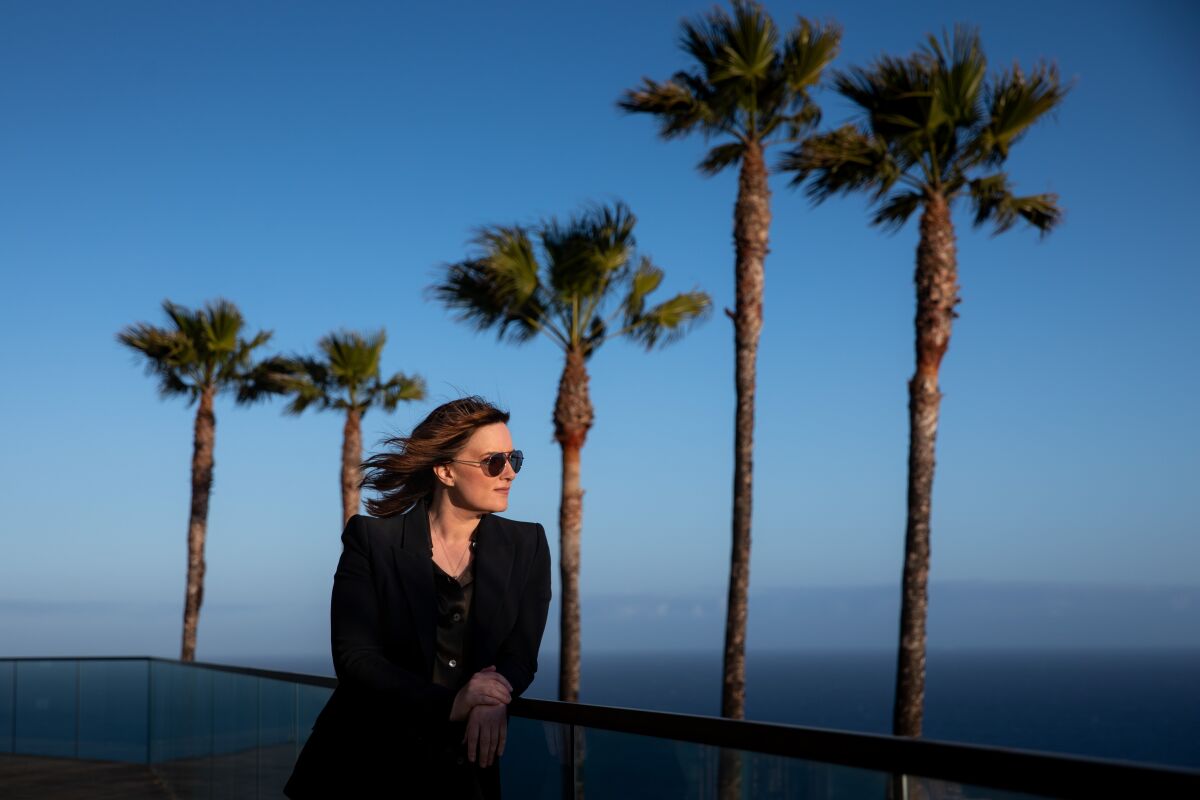On their first day working together last year at Malibu’s storied Shangri-La recording studio, Brandy Clark and her producer, Brandi Carlile, turned their attention to a heartbreaker of an acoustic ballad then titled “If You Don’t Love Me Anymore.”
Clark’s tune runs down the narrator’s planned self-care regimen in the event that she’s jilted — she’ll fly first-class to Paris, she’ll take trippy drugs, she’ll start doing yoga — though it ends with the gutting admission that none of it is likely to heal the wound: “I’ll meet somebody else / Probably get married,” she sings over fingerpicked guitar, her voice cracking ever so slightly at the edges, “I’ll keep it to myself / But I’ll love you till I’m buried.”
It was a perfect song, Carlile decided at Shangri-La — except for the line about yoga.
“She was like, ‘Man, I don’t know, I just don’t think you’d do yoga,’” Clark, 47, says of her Grammy-winning collaborator as she recounts the recording session. “And she was right. I hate yoga.”
The women tweaked the lyric and cut the song live in the studio, Clark’s microphone “turned up as hot as it would go,” the singer remembers, “almost like I was whispering it.” Now called “Buried” — the title was another thing Carlile thought could be improved — the ballad serves as the lead single of Clark’s new self-titled album, which reveals a different side of a country-music songwriter known for more than a decade as one of Nashville’s craftiest and most meticulous storytellers.
Looser and more introspective than her earlier records, Clark’s fourth LP, due Friday, moves away from the detailed character studies that powered hits she’s written for other acts such as Miranda Lambert’s “Mama’s Broken Heart,” about a woman raising hell after a breakup, and the Band Perry’s “Better Dig Two,” a country-radio chart-topper full of Southern gothic imagery. Here, in contrast, Clark ponders family, romance and her native Pacific Northwest in intimately scaled tunes rooted in her experiences as a queer woman in her late 40s.
“I just knew there was something in there that nobody had really heard yet,” says Carlile, who recalls being introduced to Clark by a mutual friend who’d realized she had “two gay Brandys in her phone.” Adds Carlile, herself a seasoned navigator of the territory separating the theatrical from the confessional: “I thought I could help her shed some of the affectation we all have and don’t know until we’re made aware of it.”
Brandi Carlile, left, and Brandy Clark. Carlile says she wants Clark “to be embraced by the fringe, by the marginalized, by the avant-garde outside the center of country music.”
(Claire Marie Vogel)
It’s not as though Clark lacked for recognition before teaming with the famous folk-rock star. A perennial critics’ favorite who’s been nominated for 10 Grammys, Clark is “universally revered” among her fellow country songwriters, according to Jessie Jo Dillon, one such tunesmith who’s written for George Strait and Maren Morris and who co-wrote five tracks on Clark’s new album.
“You ask anyone on Music Row, ‘Hey, you want to write with Brandy Clark?’ and they’re like, ‘Can we do it tomorrow?’ ” Dillon says.
She’s even found success on Broadway with “Shucked,” a years-in-the-making musical comedy that recently opened to warm reviews and is up for nine prizes, including best musical and best original score, at next month’s Tony Awards.
Yet as a mainstream country act, Clark — one of the very few out gay performers in Nashville — has never quite broken out. Her previous studio LP, 2020’s “Your Life Is a Record,” topped out at No. 46 on Billboard’s country chart, and she’s cracked the magazine’s country airplay tally only once, with the typically witty “Girl Next Door,” which peaked at No. 39 in 2016.
Shane McAnally, a longtime creative partner with whom Clark composed the music and lyrics for “Shucked,” reckons that if “Girl Next Door” had come out 10 or 15 years earlier — “back when the Trisha Yearwoods and Lee Ann Womacks were on the radio,” as he puts it — the single would have “dominated.” But by the mid-2010s, finely observed songs about women’s lives had been all but crowded out of country music’s center by ball-capped bros delivering hip-hop-inflected tunes about trucks and beer.

Brandy Clark and Shane McAnally at the opening night of “Shucked” on Broadway on April 4.
(Bruce Glikas / Getty Images)
To Carlile’s mind, that’s reason for Clark to abandon the country mainstream. “I don’t think that’s the place for her,” she says. “I don’t think they accept her. I know I’ll never be accepted in that machine — I know that from the Highwomen,” she continues, referring to the supergroup she formed in 2019 with Morris, Amanda Shires and Natalie Hemby. (Though the band’s debut album topped Billboard’s country chart on the strength of sales and streams, none of its singles caught on with country radio.)
“I just believe there’s a different path for Brandy,” Carlile says. “As a friend, I want her to be embraced by the fringe, by the marginalized, by the avant-garde outside the center of country music. I think she’s gonna find a home with the freaks in Americana. That’s where her music is anyway,” she adds, comparing Clark’s latest to brainy-soulful roots-music classics like Lucinda Williams’ “Car Wheels on a Gravel Road” and Shelby Lynne’s “I Am Shelby Lynne.”
“I’ve always wanted to pull her over to my side of the line,” Carlile says, “where I know that she can find her due.”
Clark, who exudes a calming presence that calls to mind a therapist or a kindergarten teacher, seems less concerned than Carlile with where exactly she fits into the music industry. “I don’t feel any better about having a hit song than I do about having a song that I’m really proud of having written,” she says as she sips a Fresca at the Malibu home she shares with her manager, Gail Gellman, with whom she’s also in a romantic relationship. Clark splits her time between this sleek hillside spot and a place in Nashville; today, the couple’s three small dogs are scampering after her as though they know she’s got a flight to catch in the morning.
“The difference is that one of those songs will buy me a new car,” Clark continues. “But, you know, a car rusts.” She has a “deep respect” for artists in the Americana scene, she says, and hopes her new album is received as a “further step into that world.” Yet there she was on this month’s glitzy Academy of Country Music Awards, reading corny banter off a prompter and performing alongside Ashley McBryde, who’s found a solid footing in country’s mainstream despite some appealing quirks of her own.
Clark grew up in the tiny logging town of Morton in western Washington state — a burg so “redneck and hillbilly” that it shocked Dillon, the songwriter says with a laugh, when she and Clark visited in order to get some inspiration for “Northwest,” a yearning ode to a region “where the trees grow mountain tall” and “most of the summer feels like fall.” Clark moved to Nashville at age 22 to study the music business at Belmont University — “I’d seen on some interview that Trisha Yearwood had gone there,” she says — and later scored a publishing deal thanks in part to a well-connected teacher who’d taken an interest in her obvious talent.
She began making a name writing songs for Reba McEntire and LeAnn Rimes; not long after those hits by Lambert and the Band Perry, she placed three tunes on Kacey Musgraves’ 2013 debut, including the slyly rebellious (and casually pro-queer) “Follow Your Arrow,” which she co-wrote with Musgraves and McAnally and which won song of the year at the Country Music Assn. Awards. Clark released her first album as an artist, “12 Songs,” in late 2013, when she was 38.

Brandy Clark, left, Caylee Hammack, Ashley McBryde and Pillbox Patti perform at the 58th Academy of Country Music Awards in May.
(Theo Wargo / Getty Images)
The singer’s new LP, which follows a pair of tracks Clark and Carlile collaborated on over Zoom during the pandemic, was conceived as Clark’s “return to the Northwest,” says Carlile, who lives near Seattle. But a delay in a renovation of the producer’s home studio led them to set up instead at Shangri-La, where everyone from Bob Dylan to Metallica to Adele has recorded.
With the laidback sound of Elton John’s “Tumbleweed Connection” in her head, Carlile convened a band of crack West Coast players including drummer Matt Chamberlain and bassist Sebastian Steinberg; Jess Wolfe and Holly Laessig of the L.A. duo Lucius (who hired Carlile to oversee last year’s “Second Nature”) show up several times on ethereal background vocals.
Carlile’s relatively freewheeling approach in the studio — nobody played to a click track, for instance — took some getting used to for Clark, who was accustomed to the orderly record-making that prevails in Nashville. “But after a little bit of push and pull, I just said, ‘Brandi, I’m gonna trust you,’ ” Clark remembers. “ ‘I’m gonna do it your way.’ And once I let myself relax into that, it was fantastic.”
Clark’s confidence in her was “life-affirming,” Carlile says, not least because — unlike with up-and-coming Lucius or with Tanya Tucker, whose 2019 “While I’m Livin’” Carlile produced as a “love-struck fan girl” — this time she was “going eye to eye with a contemporary who’s probably a better songwriter than me.”
What’s Brandy Clark do better than Brandi Carlile?
“She synthesizes,” Carlile says. “She takes all the information and all the feelings, and she knows what the important ones are. I haven’t been able to really move past the narcissism of thinking they’re all important, which is why every other song of mine goes on for 6½ minutes. I really envy her.”
Lenny Waronker agrees with Carlile’s assessment. “Brandy’s so precise,” says the veteran producer and A&R exec who works with Clark at Warner Records (and whose long career includes earlier collaborations with Randy Newman, Brian Wilson and Dwight Yoakam, among many others). “Every line in one of her songs leads to another line. And she does it using common words without any effort to show off.”
Among the LP’s high points are “She Smoked in the House,” a tender reminiscence of Clark’s late grandmother that she wrote after listening obsessively to Merle Haggard’s “Are the Good Times Really Over (I Wish a Buck Was Still Silver),” and the bluesy opener, “Ain’t Enough Rocks,” about an abusive father who gets his comeuppance. To flesh out the song, Carlile called in a favor from guitarist Derek Trucks, whose playing she praises as “demonic.”
“There’s a part of Brandy that’s drawn to problematic people,” says McAnally. “She’s almost giddy when someone shares a dark secret. And she would never repeat it. She would never judge anyone for it. I can tell you that woman is a vault — everybody puts their secrets in her.”
Then there’s the album’s emotional centerpiece — and potential breakout track — “Dear Insecurity,” a stately, piano-based duet with Carlile in which the two take turns directly addressing the damaging feeling that “takes up half this bed, living rent-free in my head.” As the song climaxes, Clark sings, “Insecurity, this time feels like love / She’s really sure of me / So please don’t f— this up.”
Asked how much thought she’d put into her choice of pronoun in that lyric, Clark says, “I didn’t think about it, and I love that. That’s a big growth for me. There would have been a time where I would’ve really thought, Should I say ‘she’ or ‘he’? But this time I was only thinking of myself, not where it would sit.”

Brandy Clark.
(Jay L. Clendenin/Los Angeles Times)
In the studio, Carlile considered asking Lucinda Williams to share vocals with Clark on the song before Clark suggested the producer do it herself. Now, Carlile thinks “it was meant for us to sing together whether I knew it right away or not,” she says. “Coming from where we come from, as queer people in country music, I think this song is an anthem.”
Clark describes herself as a “late bloomer” who didn’t know she was gay until she was in her early 20s. “And thank God, because I would’ve been that kid who was suicidal in high school,” she says. “My parents were accepting of me. It’s just that where I grew up, I didn’t really know what gay was, other than someone who got AIDS.”
The challenge once she discovered who she was was that she assumed her sexuality meant she stood no chance of becoming a singer in Nashville. “There were no out country artists at the time — quite the opposite,” she says. “I mean, Ty Herndon was trying to cover up the fact that he was caught with a man. You’d always hear whispers about people who were in the closet, and it was just like, ‘Oh, that can never get out.’ ”
What changed Clark’s thinking was turning 30 in 2005, at which point she assumed she was too old to be signed anyway. Today she says she’s glad that a label took so long to take an interest in her. “In my 20s, if somebody would’ve said, ‘Hey, we want to pay for you to make a record, but you’re gonna have to stay in the closet,’ I would’ve done it,” she says.
Looking back over the last decade, Clark says, “I don’t think I’ve ever felt like my sexuality has been an impediment to my career. I don’t know what people say behind my back. And I don’t know what doors haven’t opened because of it. But I don’t care, because those weren’t the right doors for me to walk through. And I feel like because of my sexuality I get to walk through different doors.”
She says being gay is “a huge part of why Brandi wanted to work with me” and that “it’s a huge part of why Shane and I have such a deep connection.” (McAnally is gay.) “I got a lot of strength from him, because I met him around the time I was coming out, and I thought, well, man, it’s one thing to be a lesbian in Nashville — but it’s another thing to be a gay man walking into these rooms with all these guys in camo.” She laughs. “I figured if he could be out than I could be out too.”
In an era of legislation hostile to queer people — a bill recently signed into law by Tennessee Gov. Bill Lee restricts drag performances in certain areas of that state — does Clark feel an obligation to speak out on issues affecting the LGBTQ+ community?
“I wish I was more articulate on those things,” she says. “In that particular case, that’s not a tricky stand to take,” she adds of the drag law. “It’s real stupid. I don’t even understand what the point is.”
Broadway, of course, has proved to be a hospitable place for Clark’s naturally progressive ideals. Asked whether she’d want to write another musical after “Shucked,” which extends a plot about corn to endearingly absurd lengths, she says she’d love to but that she’s being careful in selecting the subject matter.
“I’ve had a hard time letting go of the show, so my enthusiasm about working with Shane again means I might jump into ‘Fresca: The Musical,’ ” she says, lifting the can in her hand. “I keep reminding myself that this is a five- to 10-year commitment.”
As for the Tonys, she’s hopeful but cautious. “A lot of people think I’ve won a Grammy, but I haven’t,” she says. “I’ve just been nominated a bunch of times. I said once a long time ago, ‘Am I gonna have to win a Tony before I win a Grammy?’ ” She laughs. “If that happens, I owe you a drink.”
This story originally appeared on LA Times

